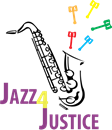What is the Justice Gap?
Eighty Six percent (86%) of low income Americans who have civil legal problems receive inadequate or no legal help. Seventy One percent (71%) of low-income households experienced at least one civil or legal problem in the last year. (Source: 2017 Justice Gap Report). This discrepancy between legal representation for civil cases and the need for legal services for low-income individuals is known as the “Justice Gap.”
The role of Jazz4Justice in helping to close the Justice Gap
Jazz4Justice creates partnerships to raise the community’s awareness of the need to close the Justice Gap, which in turn brings in additional new financial support for Legal Aid and university music education programs.
Upon setting up the partnerships, the role of the Jazz4Justice central non-profit is to collaborate with our partners to get the word out to the local legal community, music community, and business community. Concert goers learn about the importance of supporting legal aid and the intersection of Jazz and Justice. Although the Jazz4Justice central non-profit is involved in the event, the fundraising is invested directly back into the local community.
The “formula” for a Jazz4Justice concert is simple. University, or Community College music programs host an annual concert featuring Jazz music. The partnering local legal community solicits sponsors and promotes the concert to the general community. Proceeds from the event (minus expenses) are divided between the local Bar Foundation/local Legal Aid and the music program.
It is estimated that over 3000 students and concert attendees experience a Jazz4Justice concert, with sponsorships raising approximately $70,000 annually. The money raised from Jazz4Justice concerts affects an ever increasing number of the Virginia population. There are 8 million people in the Commonwealth of Virginia, 1 million of whom are eligible for the services of Legal Aid. Jazz4Justice concerts help close the Justice Gap so that those low-income individuals may access legal services.
One measure of the success of a Jazz4Justice concert is money raised to support Legal Aid, pro bono programs and student scholarships. Another measure of success is the increased public awareness of the Justice Gap problem that is growing in America. Jazz4Justice serves as a public service platform to bring recognition to a problem that is invisible to many Americans.
The Jazz4Justice central non-profit records data from each concert. “Success” is different in each location. While one school may have 30,000 students and a large venue that brings in $22,000 from its concert, another may have 2,500 students and a small concert hall that brings in $5,000. Proceeds are in keeping with the locality and school’s size.
Funds are split between legal and music partners. The Jazz4Justice non-profit is managed and operated by volunteers.
Aside from fundraising, Jazz4Justice offers an opportunity for student performers to learn a valuable lesson about how their work as musicians can be a catalyst for social good. One of the most touching stories was from a Jazz4Justice concert to a packed house at James Madison University in Harrisonburg, Virginia. After the concert, three student musicians approached Ed and said, “Mr. Weiner, we never really understood the purpose of this concert until now, we have pooled our money and we would like to donate to the cause.” They handed him $25 cash. Ed knew the message got through.
Antonio Garcia, former Director of Jazz Studies at Virginia Commonwealth University, Richmond Virginia (now in their ninth year of J4J concerts) says, “Justice for all is a never-ending quest, and pro bono legal work is a critical part of that journey. While many music genres could be a match, jazz is ideal because of its ongoing link to social justice”.
Ann Kloeckner, Executive Director of Legal Aid Works in Fredericksburg, Virginia, a beneficiary of J4J at the University of Mary Washington and now in its eighth year of J4J concerts, recently wrote, “I know how important this cause is… I promise that we will work hard to nurture… jazz and justice for all in the Fredericksburg region. Our event grew from 300 to 500 attendees in just one year. That tells me the Jazz4Justice ‘has legs!’ Because of your vision, domestic violence victims will be protected, homeless people will be helped, and vulnerable people in poverty will have their rights protected.”
Jazz4Justice has won recognition from the American Bar Association for Innovative Projects as well as an award from the Virginia State Bar as a worthwhile program.

